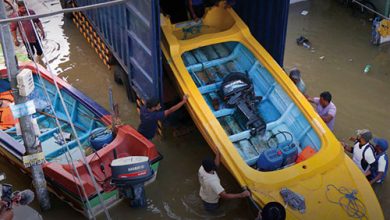FIGHTING GRAFT
THE ANTI-CORRUPTION DRIVE
Rajika Jayatilake notes that aid is being withheld to coerce countries to fight the scourge of corruption
Mahatma Gandhi once said that “there’s enough on this planet for everyone’s needs but not for everyone’s greed.” The chronic poverty and deprivation of the world’s poor nations despite the consistent generosity of affluent countries bear testimony to this statement.
The Director of the Center for Global Prosperity in Washington D.C. Dr. Carol Adelman notes: “Foreign aid cannot substitute dollars for will and honesty. If governments are not willing to create a democracy, and the conditions for growth and investment, we cannot expect more foreign aid to help them out of their poverty.”
In her view, the poorest countries – in which private investment has reduced notably due to corruption and inefficiency – cannot grow “without open markets and societies, and the rule of law [being] enforced to stop corruption.”
Research undertaken by the International Monetary Fund (IMF) reveals that investment in corrupt nations is almost five percent less than in relatively corruption-free countries. “Public-sector corruption siphons US$ 1.5 trillion to two trillion dollars annually from the global economy in bribes, and costs far more in stunted economic growth, lost tax revenues and sustained poverty,” states a recent IMF research paper.
The IMF’s MD Christine Lagarde explains that “while the direct economic costs of corruption are well-known, the indirect costs may be even more substantial and debilitating, leading to low growth and greater income inequality. Corruption also has a broader corrosive impact on society. It undermines trust in government and erodes the ethical standards of private citizens.”
French economist and author who developed the economic concept of opportunity cost and introduced the ‘Parable of the Broken Window’ Claude-Frédéric Bastiat once said that “when plunder becomes a way of life for a group of men in a society, over the course of time, they create for themselves a legal system that authorises it and a moral code that glorifies it.”
When corruption is rampant, investment does not reach the sectors that need it most or offer the best value for money. Education and healthcare in developing countries desperately need investment but are bypassed in favour of large infrastructure projects or procurements for the military where kickbacks are high.
Nevertheless, the public in the world’s vulnerable communities appear to have reached the limit of tolerating corrupt politicians. And more countries are accepting external assistance to fight government corruption.
Against this backdrop, the IMF has tied financial aid to fighting corruption for the first time. It made the establishment of a special court to handle anti-corruption a condition to offering financial aid to Ukraine – which has agreed to set up such a court by next year, as well as provide it with the necessary resources and independence to try corruption cases. This could well become a global trend.
Meanwhile, the hero of Ukraine’s 2014 Revolution of Dignity and journalist-turned-politician Serhiy Leshchenko who has fought corruption in the East European nation for many years recently suggested that “the IMF should not give one more dollar to Ukraine until the Anti-Corruption Court is in operation.”
He says that unless the IMF withholds aid until the court is established, it will never take place as “parliament is corrupt and the president doesn’t want an anti-corruption system because it will hurt his cronies who use political power for personal enrichment.”
Yet, the newly created National Anti-Corruption Bureau of Ukraine (NABU) has made things happen. Two high-profile arrests – probably the highest in contemporary Ukraine – were made by the NABU recently when the former head of customs and State Fiscal Service Roman Nasirov and ex-MP Mykola Martynenko were taken into custody. But the latter was released without bail following a powerful group of ministers and MPs vouching for him in court.
“There is no question, the judicial and legal system in Ukraine is for sale,” the US-Ukraine Business Council’s President Morgan Williams maintains. With the trend of NABU activity with 40 cases of corruption sent to court and seizure of over US$ 200 million in assets, the IMF has conceded that it’s functioning well but the Ukrainian government needs to rapidly “operationalise” the Anti-Corruption Court to “create a virtuous circle.”
The IMF’s concerns appear to be justified. A few months ago, former President of Georgia Mikheil Saakashvili – who was invited into the Ukraine government as a symbol of transparency and unsullied governance – resigned, citing an inability to function due to the central government’s unrelenting obstructions to his efforts to root out corruption.
Earlier, the Economy Minister Aivaras Abromavičius resigned refusing to be a “smoke screen” for corruption. This was followed by the stepping down of Chicago-born Finance Minister Natalie A. Jaresko.
Ukraine’s “greatest resource is the young educated Ukrainians who given the opportunity would become effective, honest public servants and political leaders, eager to rid the country of corruption,” Saakashvili wrote in a New York Times op-ed.
As the late Austrian satirical writer Karl Kraus once observed: “Corruption is worse than prostitution. [While] the latter might endanger the morals of an individual, the former invariably endangers the morals of the entire country.”








French economist and author Claude-Frédéric Bastiat is so damn right in his remark, “when plunder becomes a way of life for a group of men in a society, over the course of time, they create for themselves a legal system that authorises it and a moral code that glorifies it.”
Evidence abounds in Sri Lanka and elsewhere in the world that this continues to happen more or less right under the very noses of the people (may be even with their blessings in some cases) who’re entrusted with fighting corruption. It’s frightening to see corruption dictating the fates of the developing and under-developed countries where education and healthcare investments are bypassed for large infrastructure projects and military procurement where kickbacks are much higher.
This any way doesn’t mean that corruption isn’t at play in education and healthcare investments, either. This is so, because where corruption takes root, lawlessness becomes a societal and political norm.
I believe in Ukraine’s case, the establishment of anti-corruption court to ensure and enforce the accountability of the government in the disbursement of IMF aid is a very practical measure. Even Sri Lanka is in need of a similar system. Also, the world is dire need of a more progressive value and belief system that is truly humanitarian and that cuts across all the artificial social religious and political divides.